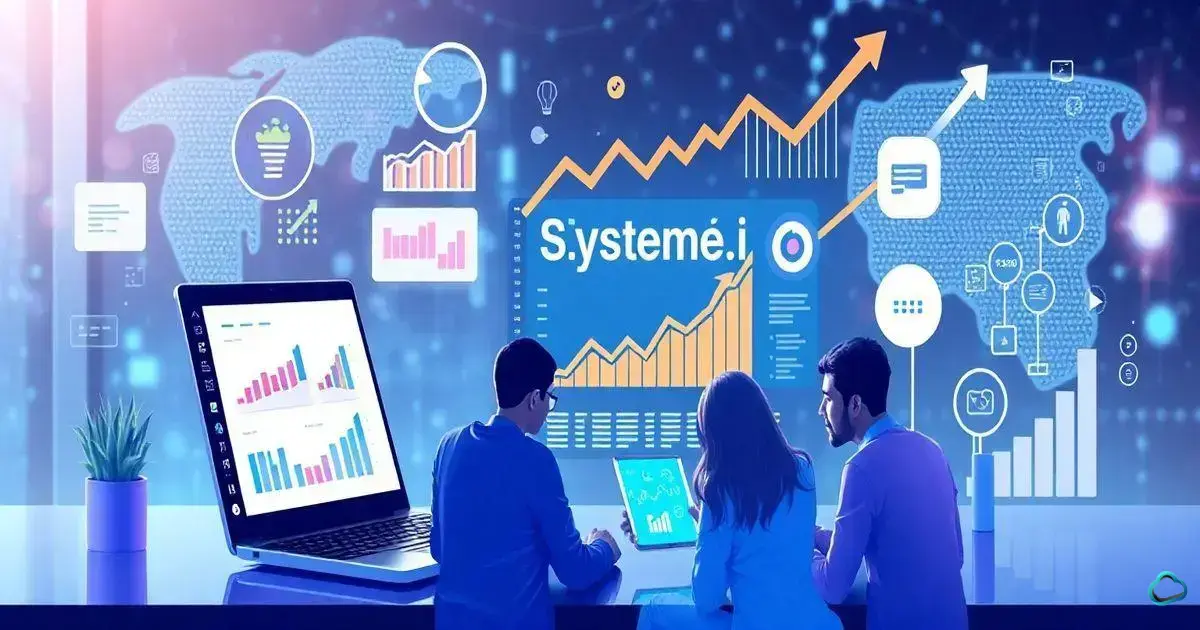Contents
- 0.1 The integration of artificial intelligence (AI) into Software as a Service (SaaS) tools is revolutionizing business operations by enhancing functionality, personalizing user experiences, automating processes, providing advanced data analytics, and improving security measures.
- 0.2 As AI continues to evolve, it will drive innovation in SaaS applications, enabling businesses to operate more efficiently and deliver exceptional customer experiences.
- 1 1. The Role of AI in Enhancing SaaS Functionality: Discuss how AI capabilities like machine learning and natural language processing improve the features of SaaS tools.
- 2 2. Personalization and User Experience: Explore how AI enables SaaS platforms to deliver tailored experiences to users, improving engagement and satisfaction.
- 3 3. Automation of Processes: Examine how AI automates repetitive tasks in SaaS applications, increasing efficiency and productivity.
- 4 4. Advanced Data Analytics: Outline how AI-powered analytics provide insights that drive smarter decision-making for businesses using SaaS tools.
- 5 5. Integration of AI in SaaS Security: Analyze the role of AI in enhancing security measures within SaaS tools, protecting data and user privacy.
- 6 6. Future Trends in AI and SaaS Development: Discuss emerging trends and how they may shape the next generation of SaaS tools, focusing on AI innovations.
- 7 Frequently Asked Questions about AI in SaaS Tools
- 7.1 How is AI changing the functionality of SaaS tools?
- 7.2 What role does AI play in personalizing user experiences in SaaS tools?
- 7.3 How does AI contribute to automating processes in SaaS applications?
- 7.4 What are the benefits of AI-powered analytics in SaaS tools?
- 7.5 How does AI enhance security in SaaS tools?
- 7.6 What future trends in AI and SaaS development should businesses be aware of?
The integration of artificial intelligence (AI) into Software as a Service (SaaS) tools is revolutionizing business operations by enhancing functionality, personalizing user experiences, automating processes, providing advanced data analytics, and improving security measures.
As AI continues to evolve, it will drive innovation in SaaS applications, enabling businesses to operate more efficiently and deliver exceptional customer experiences.
The rise of artificial intelligence (AI) has begun to redefine the landscape of Software as a Service (SaaS) tools. As businesses increasingly rely on cloud-based solutions, incorporating AI into these tools offers a multitude of benefits, from automating mundane tasks to providing advanced analytics and personalized experiences. This article delves into the myriad ways AI is influencing the future of SaaS tools, helping organizations stay competitive in a rapidly evolving digital environment.
1. The Role of AI in Enhancing SaaS Functionality: Discuss how AI capabilities like machine learning and natural language processing improve the features of SaaS tools.
Artificial intelligence has become a cornerstone for enhancing the functionality of Software as a Service (SaaS) tools. By integrating AI technologies such as machine learning and natural language processing, these tools are evolving to meet the complex demands of modern businesses.
Machine Learning Algorithms
Machine learning allows SaaS tools to learn from data patterns and improve their performance over time. For instance, predictive analytics can help businesses forecast trends and make data-driven decisions. Tools can analyze vast amounts of data, providing insights that would be impossible for humans to derive alone.
Natural Language Processing (NLP)
Natural language processing empowers SaaS applications to understand and interpret human language. This capability is essential for chatbots and virtual assistants that enhance customer support experiences. By processing customer inquiries and providing relevant solutions, NLP significantly improves user interactions with SaaS platforms.
Enhanced User Interfaces
AI technologies enable the creation of smarter user interfaces that adapt to individual user needs. For example, intelligent dashboards can adjust the displayed data based on user behaviors and preferences, allowing for a more personalized experience.
Improved Collaboration Tools
AI-enhanced features such as scheduling assistants and automated meeting notes streamline collaboration among team members. By reducing time spent on administrative tasks, these tools allow users to focus on more critical aspects of their work.
Real-Time Data Processing
AI enables SaaS tools to process data in real-time, providing users with instant insights and analytics that enhance decision-making. This capability is particularly beneficial for businesses operating in fast-paced environments where timely information is crucial.
Overall, the integration of AI capabilities like machine learning and natural language processing is fundamentally transforming SaaS tools, making them more functional and effective in addressing the unique challenges faced by businesses today. As this trend continues, we can expect even greater advancements in the capabilities of SaaS platforms.
2. Personalization and User Experience: Explore how AI enables SaaS platforms to deliver tailored experiences to users, improving engagement and satisfaction.

In an era where customer experience is paramount, personalization has emerged as a critical component for SaaS platforms. Artificial intelligence plays a pivotal role in enabling these tools to create tailored experiences that not only enhance user engagement but also drive satisfaction and loyalty.
Data-Driven Personalization
AI leverages user data to tailor recommendations, content, and features based on individual behaviors and preferences. By analyzing past interactions, SaaS platforms can predict what users are likely to need next, creating a more personalized experience.
Dynamic Content Delivery
With AI, SaaS tools can dynamically adjust the content displayed to users based on their interests and engagement patterns. For example, a CRM platform can showcase different dashboards or reports based on the unique needs of each user, ensuring that relevant information is immediately accessible.
Intelligent Onboarding Processes
AI enhances the onboarding experience for new users by customizing tutorials and guidance based on their specific roles and expertise levels. Personalized onboarding helps users feel more comfortable navigating the platform, ultimately improving adoption rates.
Enhanced Customer Support
AI-powered chatbots and virtual assistants improve customer support by offering tailored responses to user queries. These systems learn from previous interactions, providing increasingly relevant information and resolving issues more efficiently.
Feedback-Driven Improvements
AI can analyze user feedback and sentiment to identify areas for improvement in real time. By understanding how users feel about specific features or services, SaaS providers can make rapid adjustments to enhance the user experience.
By harnessing the power of AI, SaaS platforms are able to deliver increasingly personalized and engaging experiences. This focus on customization not only fosters greater satisfaction and loyalty among users but also sets the groundwork for long-term success in a competitive landscape.
3. Automation of Processes: Examine how AI automates repetitive tasks in SaaS applications, increasing efficiency and productivity.
The automation of repetitive tasks has become a cornerstone of operational efficiency in today’s business landscape. With the integration of artificial intelligence in Software as a Service (SaaS) applications, organizations are discovering a new level of productivity and effectiveness. This section examines how AI-driven automation streamlines workflows and enhances overall performance.
Streamlined Workflow Automation
AI technologies can automate routine workflows within SaaS applications, reducing the time employees spend on mundane tasks. For example, AI can manage document approvals, data entry, and compliance checks automatically, allowing teams to focus on strategic initiatives that require human insight and creativity.
Task Scheduling and Reminders
AI-powered task scheduling tools can intelligently assign deadlines and reminders based on workloads and individual capabilities. This proactive management ensures that tasks are completed on time, significantly enhancing team productivity and accountability.
Automated Reporting and Analytics
AI enables the automatic generation of reports and analytics by pulling data from various sources within the SaaS application. This functionality saves time and reduces errors, providing teams with accurate, real-time insights to drive informed decision-making.
Lead Scoring and Management
In customer relationship management (CRM) platforms, AI automates lead scoring by analyzing potential customers’ behaviors and interactions with the brand. This process allows sales teams to prioritize high-quality leads, ultimately increasing conversion rates and revenue.
Integration with Other Systems
AI automates data integration between different SaaS applications, ensuring seamless communication and data flow. This interoperability minimizes the risk of data silos and enhances overall operational efficiency, enabling teams to work more collaboratively across platforms.
The automation of processes through AI in SaaS applications is revolutionizing productivity for businesses. By reducing manual effort and error, organizations can allocate resources more effectively, leading to increased efficiency and enhanced overall performance.
4. Advanced Data Analytics: Outline how AI-powered analytics provide insights that drive smarter decision-making for businesses using SaaS tools.

In the age of information, data analytics has emerged as a powerful tool for businesses seeking to navigate complex environments and make informed decisions. With the integration of artificial intelligence, SaaS platforms are now equipped to provide advanced data analytics that uncover valuable insights. This section outlines how AI-driven analytics reshapes decision-making processes across various industries.
Predictive Analytics:
AI-powered predictive analytics utilizes historical data, statistical algorithms, and machine learning techniques to forecast future outcomes. For instance, businesses can predict customer behavior, sales trends, and market shifts, enabling proactive strategies and informed decision-making.
Real-Time Data Insights:
With AI, SaaS tools can analyze data in real time, providing businesses with immediate insights that facilitate timely decisions. This ability to access up-to-date information is critical in fast-paced environments where every moment counts.
Data Visualization Tools:
AI enhances data visualization by generating intuitive dashboards and visual representations of complex data sets. These visual tools help stakeholders easily identify trends, anomalies, and patterns within their data, simplifying the decision-making process.
Segmentation and Targeting:
AI-driven analytics allow businesses to segment their audience based on various parameters, such as behaviors, demographics, and preferences. This capability enables targeted marketing strategies that resonate more effectively with specific customer segments, enhancing conversion rates and customer satisfaction.
Sentiment Analysis:
AI technologies can perform sentiment analysis on customer feedback, social media interactions, and online reviews. Understanding public sentiment helps businesses gauge customer satisfaction and brand perception, allowing for data-driven improvements in products and services.
AI-powered advanced data analytics is transforming how businesses leverage their data, enabling smarter decision-making through predictive insights and real-time analysis. By embracing these technologies, organizations can enhance their strategic initiatives and gain a competitive edge in their respective markets.
5. Integration of AI in SaaS Security: Analyze the role of AI in enhancing security measures within SaaS tools, protecting data and user privacy.
As the reliance on Software as a Service (SaaS) tools grows, so does the need for robust security measures to protect sensitive data and user privacy. Artificial intelligence is revolutionizing the security landscape, enabling SaaS platforms to implement advanced, proactive strategies. This section analyzes the role of AI in enhancing security within SaaS applications.
Threat Detection and Response
AI algorithms can analyze patterns in user behavior and system activity to identify anomalies that may indicate a security threat. By detecting potential breaches earlier, SaaS companies can respond quickly to mitigate risks and safeguard user data.
User Authentication and Access Control
AI enhances authentication processes, such as biometric recognition and multi-factor authentication, by continuously learning from user behaviors. This adaptive security measure ensures that only authorized users gain access to sensitive information, significantly reducing the risk of unauthorized access.
Predictive Risk Assessment
AI tools can evaluate potential vulnerabilities in SaaS applications by analyzing data from various sources, including past incidents and ongoing threat intelligence. This predictive capability allows organizations to proactively address security gaps before they can be exploited.
Automated Compliance Monitoring
AI can automate the monitoring of compliance with regulations such as GDPR and HIPAA. By continuously scanning for compliance-related issues and violations, SaaS platforms can ensure that they meet legal requirements and protect user privacy effectively.
Incident Response Automation
In the event of a security incident, AI can streamline the incident response process by automating various tasks, such as data containment, threat elimination, and post-incident analysis. This speed and efficiency help reduce the impact of security breaches.
The integration of AI in SaaS security measures is crucial for protecting data and enhancing user privacy. By enabling smarter threat detection, robust access controls, and automated compliance monitoring, AI empowers organizations to build a more secure environment for their users, ultimately fostering trust and confidence in SaaS solutions.
6. Future Trends in AI and SaaS Development: Discuss emerging trends and how they may shape the next generation of SaaS tools, focusing on AI innovations.

The landscape of Software as a Service (SaaS) is evolving rapidly, driven by innovations in artificial intelligence (AI) and changing user expectations. As businesses seek more efficient, scalable, and customized solutions, several emerging trends promise to shape the next generation of SaaS tools. This section discusses these trends and their implications for the future.
AI-Driven Personalization at Scale: Future SaaS tools will leverage AI to provide highly personalized experiences on a larger scale. By utilizing advanced algorithms, these platforms will adapt in real time to user behavior, preferences, and needs, enhancing user engagement and satisfaction.
No-Code/Low-Code AI Development: The emergence of no-code and low-code platforms will allow users with minimal technical expertise to build and customize their own AI applications within SaaS tools. This shift will democratize access to AI, enabling a broader range of businesses to innovate and optimize their processes.
Integration of AI with IoT: As the Internet of Things (IoT) continues to expand, SaaS applications will increasingly integrate AI to analyze data from connected devices. This will facilitate real-time decision-making and automate activities based on data collected from sensors and devices, enhancing operational efficiency.
Enhanced Data Privacy and Security Features: In response to growing concerns over data privacy, future SaaS tools will incorporate robust AI-driven security measures that proactively protect user data. Innovations in encryption, real-time threat detection, and compliance monitoring will be pivotal in fostering trust and safeguarding sensitive information.
Collaborative AI in SaaS Tools: Future SaaS applications will harness collaborative AI, where multiple AI systems work together and learn from shared data. This trend will enable more sophisticated insights and solutions, leading to smarter applications that can predict and respond to complex user needs across various contexts.
As AI technology continues to evolve, its integration into SaaS development will open new frontiers for innovation and efficiency. The trends discussed herein will not only shape the capabilities of future SaaS tools but will also redefine how organizations approach technology in their daily operations, ultimately driving growth and competitive advantage.
In conclusion, the integration of artificial intelligence into Software as a Service (SaaS) tools is reshaping the business landscape in profound ways.
From enhancing functionality through machine learning and natural language processing to delivering personalized user experiences, AI is driving efficiency and innovation.
The automation of repetitive processes liberates human resources for more strategic tasks, while advanced data analytics empower organizations to make informed decisions based on real-time insights.
Furthermore, AI’s role in strengthening security measures ensures that data protection and user privacy remain paramount in a digital-first world.
Future Trends
As we look to the future, emerging trends such as AI-driven personalization at scale, no-code and low-code development, IoT integration, and collaborative AI promise to further transform SaaS applications, making them smarter, more adaptable, and user-centric.
By embracing these changes, businesses can not only improve their operations but also enhance customer satisfaction, fostering long-term loyalty and success in the rapidly evolving market.
Frequently Asked Questions about AI in SaaS Tools
How is AI changing the functionality of SaaS tools?
AI enhances the functionality of SaaS tools by incorporating machine learning and natural language processing, enabling smarter features such as predictive analytics, personalized experiences, and improved user interfaces.
What role does AI play in personalizing user experiences in SaaS tools?
AI allows SaaS platforms to analyze user data and behavior, enabling them to deliver tailored recommendations, customize content, and improve engagement through intelligent onboarding processes and enhanced customer support.
How does AI contribute to automating processes in SaaS applications?
AI automates repetitive tasks such as data entry, reporting, and workflow management, allowing organizations to increase efficiency and focus on more strategic initiatives, ultimately enhancing productivity.
What are the benefits of AI-powered analytics in SaaS tools?
AI-powered analytics provide real-time insights, predictive capabilities, and data visualization tools that facilitate smarter decision-making, enabling businesses to understand trends, improve segmentation, and execute targeted marketing strategies.
How does AI enhance security in SaaS tools?
AI improves SaaS security through advanced threat detection, user authentication, predictive risk assessment, automated compliance monitoring, and incident response automation, helping protect data and safeguard user privacy.
What future trends in AI and SaaS development should businesses be aware of?
Emerging trends include AI-driven personalization at scale, no-code and low-code AI development, integration with IoT, enhanced data privacy features, and the use of collaborative AI systems, all of which will shape the future of SaaS tools.






